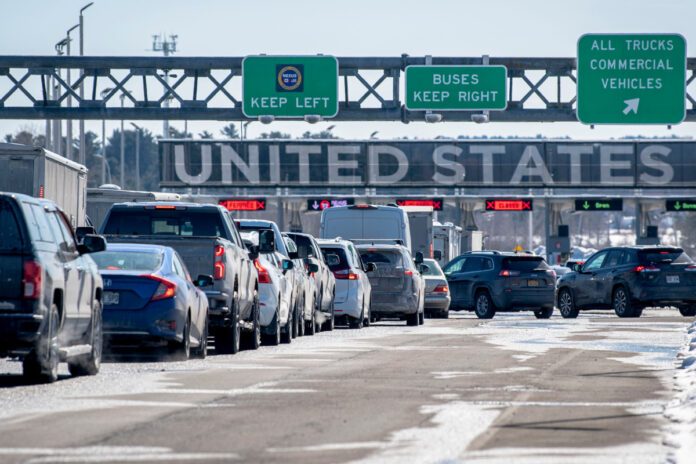Canada puts more pressure on the US and less on Mexico
Canada, the US’ largest car export market, has enacted a 25% reciprocal tariff on US auto imports in response to the Trump administration’s vehicle tariffs that began on April 3. While Canada’s decision, which was announced yesterday, escalates its trade war with the US, Canada’s tariffs will only impact US vehicles that aren’t compliant with the Canada-US-Mexico Agreement (CUSMA).
Officials estimate that only about 8% of the 750,000 vehicles the US ships to Canada annually are non-compliant with the CUSMA, according to The Wall Street Journal. Violations of the CUSMA in this context would apply to regional value content (RVC), labor value content (LVC), steel and aluminum, and core parts requirements. For RVC, US vehicles exported to Canada must have a 75% RVC from the US, Canada, or Mexico, or 70% for heavy trucks. Regarding LVC, a portion of an exported car’s value must be sourced from factories with workers earning at least $16 an hour, and a vehicle must have 70% of its steel and aluminum gathered in North America. Lastly, certain core parts, including but not limited to engines, transmissions, and axles, must undergo North American production.
Getty
However, Canada’s new auto tariff plan won’t affect Mexico, emphasizing Canada’s focus on getting the US to remove recent levies. François-Philippe Champagne, Canada’s Minister of Finance, said: “Canada continues to respond forcefully to all unwarranted and unreasonable tariffs imposed by the US on Canadian products. The government is firmly committed to getting these US tariffs removed as soon as possible, and will protect Canada’s workers, businesses, economy and industry,” according to a Canadian government release. Additionally, the Canada Automotive Parts Manufacturers’ Association lead, Flavio Volpe, doubled down on this decision, specifying to CNBC that the Canadian government specifically avoided affecting Mexico’s finances.
How have the tariffs affected US to Canada exports?
Vehicle exports from the US into Canada equaled $35.6 billion in 2024. Following Trump’s implementation of a 25% tariff on auto imports, Stellantis temporarily shut down production at its Windsor, Ontario facility for two weeks while halting operations during April at its Toluca Assembly Plant in Mexico. Ford, General Motors (GM), and Stellantis are the three major automakers most impacted by Canada’s retaliatory tariffs since they hold the largest share of Canadian sales relying on imports from the US. Canada is currently working on a “remission framework for auto producers that incentivizes production and investment in Canada and helps maintain Canadian jobs,” according to its government’s press release. In other words, car manufacturers that apply for remission would receive relief on some tariff costs in exchange for continuing Canadian production. Additional details for the framework are arriving soon.

Getty
Final thoughts
While the tariffs that Canada is imposing on the US won’t cost as much as the US tariffs on other countries, Canada’s decision to implement the retaliatory measure against the US while making exemptions for Mexico is a symbol of its desire to resolve the trade war rather than escalate conflicts. However, Canada’s new US auto tariffs may still raise prices on the country’s cars, both affected and unaffected by the levy. Baris Akyurek, vice president of insights and intelligence at Auto Trader Canada, notes that new vehicles in Canada could experience price increases in the range of $3,000 to $12,000, according to The Globe and Mail.
